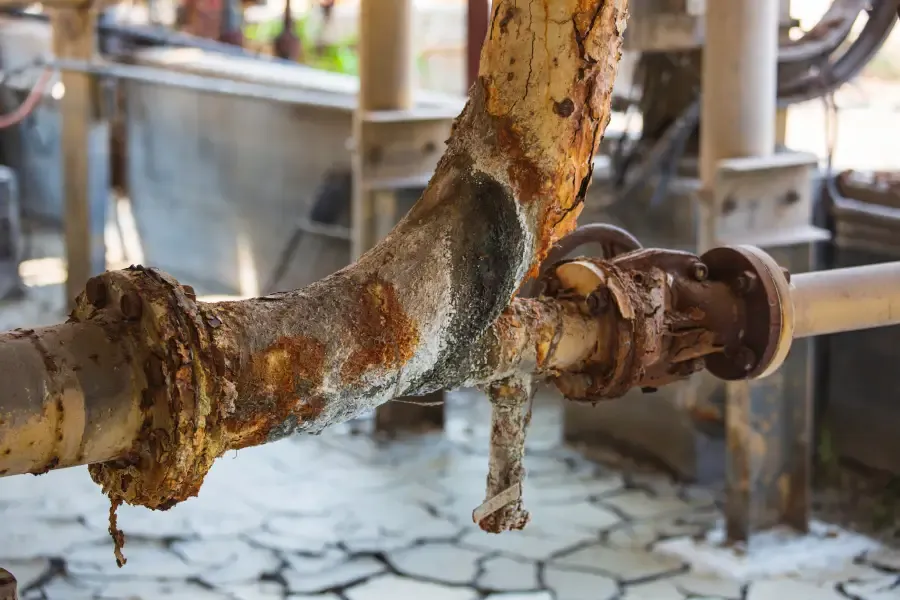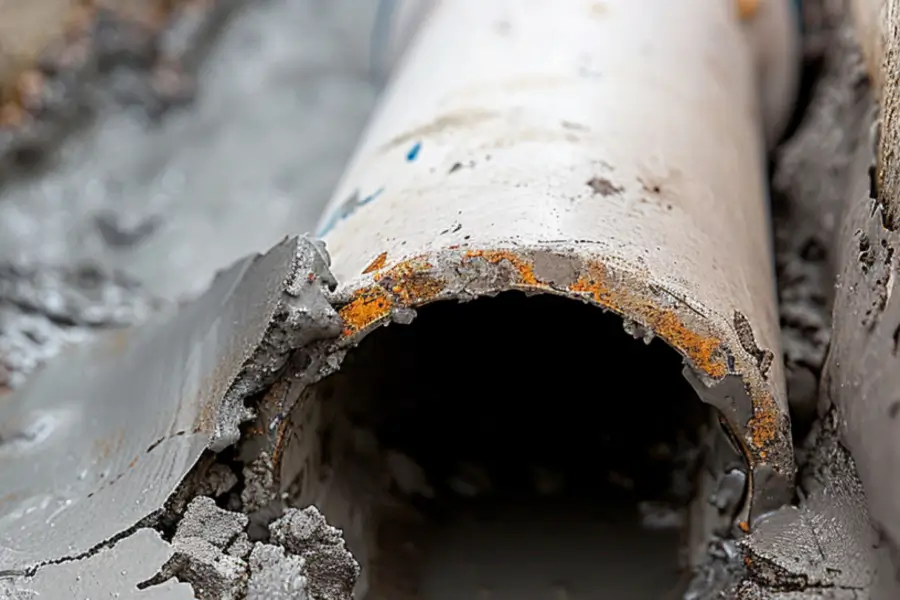What Causes Water Pipe Corrosion and How Can I Fix It?

Hundreds of gallons flow through your plumbing system every day. Over time, your pipes suffer wear and tear, but most of us don’t think about it until we discover a clog or a leak.
Oxidation, mineral buildup, and chemical reactions may all speed up pipe degradation. Learn more about what causes water pipe corrosion and what you can do about it.
Common Causes of Water Pipe Corrosion in Enoch, UT
Pipes have a long lifespan, but nothing lasts forever. Although iron, steel, and copper pipes are more durable than PVC, all plumbing systems will eventually need repair and, at some point, replacement. The following elements will chip away at your piping’s structural integrity.
Hard Water
Most of Utah has hard water, i.e., water with a high concentration of calcium, magnesium, and other minerals. Any mineral concentration above 180 PPM counts as “very hard,” and the water hardness in Cedar City, located just 7 miles from Enoch, is generally far above that number.
Thus, it’s no wonder that local homeowners struggle with mineral buildup that damages appliances and plumbing. As hard water flows through your pipes, calcium and magnesium form a layer of limescale, which gradually reduces pipe diameter, restricts water flow, and increases the pressure inside the pipes.
This increased pressure strains pipes and plumbing joints, so leaks and bursts are likelier to happen with time. Limescale can also trap moisture and accelerate corrosion in metal piping.
Harmful Chemicals
Although hard water is alkaline (often with a pH above 8.5), some household chemicals, like toilet bowl cleaners, are highly acidic. When dumped into your plumbing system, they create corrosive water that can damage metal pipes.
Drain cleaners also put your piping at risk. Often advertised as a solution to pesky clogs, they may help in the short term but will wreak havoc on your pipes if you use them too often.
Water Velocity
If you have a piping system that relies on a pump, like a circulating hot water system, water may move through your pipes too fast because of over-pumping and an uncontrolled flow rate.
Water turbulence increases with high speed, especially at plumbing joints and bends. The turbulent water blasts away inner layers exposes deeper layers, and accelerates water pipe corrosion, especially in metal pipes.
Very Hot Water
High water temperatures will speed up pipe corrosion since chemical reactions like oxidation happen more quickly in hot water. Heat also causes hard minerals to build up faster on the pipe’s inner surface. In copper pipes, heat makes it easier for copper ions to separate, which will gradually thin out the pipe walls.
Electrical Currents
Stray underground electrical currents can hit buried metal piping and cause local corrosion. As the current passes through the pipe, an anodic reaction releases metal ions into the soil, compromising the pipe’s structure over time.
Sediment
When sediments like dirt, sand, or debris from renovations flow through your plumbing system, they act like a sander, mechanically wearing away the pipe walls. Sediment can also accumulate, obstruct pipes, and create high pressure and leaks.
Bacteria
Various microorganisms in the plumbing system produce acids that eat away at pipes. For instance, sulfate-reducing bacteria make corrosive hydrogen sulfide, which degrades iron and steel. Iron-oxidizing bacteria generate acetic acid when they feed on organic matter, lowering the pH and speeding up corrosion.
Preventing Pipe Corrosion
As a homeowner in Enoch, UT, you can take several important steps to slow down water pipe corrosion. Water softeners, controlled water flow, and some basic precautions will extend your plumbing system’s life.
Install a Water Softening System
Water softeners trap calcium and magnesium ions. A water softener will reduce harmful limescale and rust in your plumbing system, protect your appliances, and dramatically improve water quality. Water will taste better, and you’ll no longer have to deal with hard water effects like dry skin and hair, soap scum, and dull laundry.
Skip Harsh Chemicals
Don’t resort to corrosive drain cleaners if your drains are slow: harsh chemicals will do more harm than good in the long run. You can often remove clogs using a basic drain snake. In more serious cases, it’s best to call your local plumber.
Avoid Using Excessively Hot Water
Keep the water temperature setting at 180 degrees or lower. This will protect your pipes and prevent scalding and burns. It may also extend your water heater’s life and lower energy bills.
Control Water Pressure
Pressure regulators help keep water pressure within a safe range (about 40-80 psi). A pressure regulator is a valve that constricts and creates reduced flow when the pressure is too high and opens when the pressure drops. This simple device can reduce strain on your piping, plumbing fixtures, and appliances.
Check Your Pipes
Pay attention to warning signs like rusty or discolored water, strange gurgling noises in your pipes, or low water pressure. Schedule a plumbing inspection to catch any leaks, cracks, or worn-out pipes. A professional inspection is especially critical if you live in an old home with an outdated plumbing system.
Fixing Corroded Pipes
You’ll want to catch and fix advanced water pipe corrosion before you need emergency plumbing services in Enoch, UT. If your plumbing system has suffered significant wear and tear, a local plumber may recommend these options.
Trenchless Pipe Repair
A damaged underground pipe is many homeowners’ nightmare. In conventional pipe repair, the crew digs trenches to access the plumbing line. It’s a messy, time-consuming process that can disrupt your life for a week or more and leave a ruined landscape behind.
Trenchless pipe repair is a faster and less invasive approach that only requires digging an access hole at each end of the damaged pipeline. Trenchless repair includes two options: lining and bursting.
Pipe lining covers the entire interior of an existing pipe, including any cracks and holes. The liner is a soft, flexible resin that the plumber inserts into the damaged pipeline and then inflates using compressed air. The liner fits precisely against the pipe’s surface. Once it dries and hardens, it creates a watertight seal. Since the liner is thin, any reduction in the pipe diameter is negligible.
However, in severely damaged pipelines, lining likely won’t be enough. In this case, you may opt for pipe bursting. The plumber will use a bursting head to tear the old pipe apart and instantly replace it with a new line. The downside of pipe bursting is that it leaves pieces of the old line behind.
Pipe Excavation and Replacement
In some situations, your plumber may recommend full excavation and replacement of the damaged pipeline. Traditional excavation-based methods will work better on badly deformed or totally collapsed pipes. Sharp curves or bends, severe tree root infiltration, or other obstacles may likewise be easier to handle via excavation.
A professional plumber will always start the job with a thorough inspection. They’ll assess the type and amount of damage to your pipes and recommend the best repair method. If excavation is inevitable, the crew will dig trenches to access and remove the old piping and install the new line.
Choosing Pipe Material
If you’re replacing a damaged pipe section, it’s important to choose the right material for your new pipes. This decision will impact your pipes’ longevity and corrosion resistance. You’ll want to hit the right balance between durability, price, and ease of installation.
Galvanized Steel
Galvanized steel is strong, comparatively affordable, and suitable for a wide range of water temperatures. A layer of zinc coating protects these pipes from corrosion. Galvanized steel pipes can last for decades with proper maintenance. However, they will corrode over time once the zinc layer wears off.
Copper
Copper pipes offer excellent longevity and resistance to corrosion. They’re a solid choice both for heating systems and supply lines. Properly installed and maintained copper pipes may last a lifetime. Copper’s main downside is its hefty price tag.
PVC
Polyvinyl chloride (PVC) is a lightweight, affordable material suitable for cold-water supply lines and drainage pipes. PVC is flexible, corrosion- and impact-resistant, and easy to install, which makes it popular with homeowners. However, it can become brittle when exposed to severe cold. PVC pipes may last 25-40 years.
CPVC
Chlorinated polyvinyl chloride (CPVCS) is a lot like PVC, but more resistant to high temperatures and thus better suited for hot water. CPVC pipes have an estimated service life of about 50 years.
PEX
Cross-linked polyethylene (PEX) pipes are versatile, simple to install, and fit for both cold and hot water installations. PEX is corrosion-resistant like PVC but more flexible and resistant to freezing. PEX pipes may last 40-50 years.
ABS
Acrylonitrile butadiene styrene (ABS) is durable, lightweight, and chemical-resistant, which makes it a good option for drainage systems. However, ABS pipes work less well for hot water lines.

Piping Problems in Enoch, UT? Call Iron Mountain Plumbing
Has water pipe corrosion compromised your plumbing? Don’t wait for an emergency. Contact us at Iron Mountain Plumbing to learn about trenchless pipe repair benefits or discuss other options for getting your plumbing system back in shape. Book a service call today.
What Not to Put Down the Drain in Parowan, UT
Five Reasons Your Garbage Disposal Stopped Working in Kanarraville, UT
Reliable Plumbing & HVAC, One Call Away!

